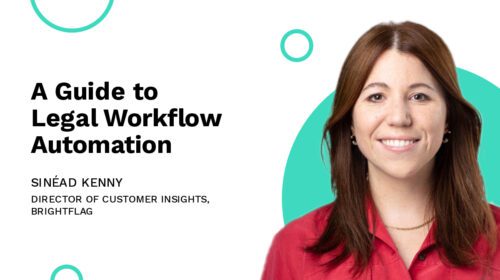AI’s Impact on the Future of Paralegals
Artificial intelligence is a powerful tool for streamlining the manual aspects of legal work. But amid all the AI hype, many legal team members are asking a valid question: “How will this new technology affect my job?”
The truth is that AI can automate a lot of the manual and admin-heavy tasks that eat up time in a corporate paralegal’s day. That can include support tasks like billing management or data wrangling, which take time away from working on deeper legal support tasks.
However, AI can’t replace the human judgment needed to keep companies safe and on track while executing those tasks.
So, what does AI mean for paralegal roles? A chance to handle routine tasks more efficiently and to increase the value the role brings to the broader legal team.
This blog looks at key ways paralegals can use artificial intelligence to expand their impact and future-proof their careers.
The Big Question: Will AI Replace Paralegals?
Short answer? No. Though legal AI is advancing at a blistering pace, AI reasoning can’t replace qualities like human expertise, empathy, soft skills, critical thinking, and ethics. However, AI will change the way paralegals work and the responsibilities they take on within their teams.
Paralegals can use generative AI tools to complete their most time-consuming, manual tasks faster. This has two related, knock-on effects. It frees up capacity. It also opens the door to involving paralegals in more complex and interesting legal work, such as in-depth legal research or analysis to support ongoing legal matters.
Paralegal Workflow Pain Points
Before we dive into the places where legal AI adds the most value to paralegal workflows, a quick recap of pain points is in order. The following tasks all represent the most time-consuming usages of paralegal time. And they’re all areas ripe for automating in the age of AI.
- Manual invoice processing: Paralegals are typically the “go-between” in invoices involving outside counsel and the company’s legal department. That includes manually forwarding invoices to finance for approval or payment, and chasing up delays or missing information.
- Lengthy data collation and reporting: A core part of the paralegal job is pulling together data for internal reports (e.g., on matter spend, law firm performance, status updates, etc). That often involves digging through emails and spreadsheets, and performing repetitive tasks like verifying and formatting data.
- Tracking down (and fixing) manual errors: Another huge time sink is the hours spent tracking and correcting errors from manual data entry. It’s a vital task, for sure. But also one that’s only necessary because of a lack of visibility into legal materials (another area where AI can be a huge help).

Transforming the Paralegal Function with AI Tools
Deployed thoughtfully, legal AI tools can alleviate all the pain points discussed above. However, the key to getting it right is understanding the tech’s strengths and where human intervention is still necessary.
Automated Invoice Validation and Routing
One of the most significant areas where generative AI tools add value for legal teams is processing tedious bulk data, like invoices. For example, features like Brightflag’s PDF Check automate the invoice intake and review process using AI to validate essential details.
For paralegals, that means no more sifting through PDFs to check that information like the bill-to entity, matter reference, and PO numbers are correct. It also means that manual errors are reduced, so no one has to waste additional time following up on data that was entered incorrectly.
AI systems can also be trained to evaluate invoices — including individual line items — against Outside Counsel Guidelines (OCGs) and to route exceptions and non-compliant invoices to the appropriate team member for action. This reduces the need for paralegals to take a first pass at the data and frees them up for higher-value tasks that improve legal service delivery.
Natural language queries and reporting
Natural language systems, like ChatGPT, have become a massive component of many corporate workflows in recent years. This tech can also be an enormous time-saver for legal teams, serving as an “AI assistant” that paralegals and other legal professionals can depend on to look up or summarize information quickly.
The caveat? Significant data risk can be associated with using generic or publicly available models with sensitive legal information. This is why using a secure, purpose-built genAI tool, like Ask Brightflag, is generally a better choice for legal teams.
A dedicated tool integrated with company data is especially valuable for busy paralegals. It makes it easy to generate accurate reports or summaries on demand. For example, instead of manually compiling data, a user could simply ask, “What did we spend on IP litigation in Q1 2025?” and get an accurate report near-instantaneously.
This speeds up access to critical insights and frees paralegals to explore related queries, follow up on trends, and contribute more strategically to matters or data analysis.
Centralized data and visibility into legal work
Like the above, many legal teams find value in consolidating their department’s information through a centralized, AI-driven platform. This “single source of truth approach” ensures that everything from budget information and billing details to matter timelines, legal documents and communications are stored in one place. They can be accessed with a simple query: “What’s the status of this matter’s budget?”
So instead of spending hours digging through emails and drives, paralegals can quickly surface key information about any matter, trend or invoice and use it to inform real-time conversations. It also makes it significantly easier to track errors, like duplicate invoices or inconsistent matter details, and correct them.
What’s important to keep in mind, however, is that not all legal platforms offer this kind of integrated functionality. That’s why it’s worth doing your due diligence in helping legal leadership select a platform that adds value.
From Admin to Strategic Partner: How AI Elevates the Paralegal Role
With AI-powered tools to handle the bulk of repetitive, manual work, paralegals are no longer restricted to performing time-consuming admin duties. Instead, they can take on a more strategic role, contributing directly to the legal department’s priorities.
That might look like supporting legal ops with budgeting, legal technology, and change management efforts. It could involve uncovering deeper insights from legal data to support GCs and senior counsel. It could also mean more focused time spent actively working on high-priority matters instead of manually digging through disconnected files and spreadsheets.
Whatever the path, AI represents a unique opportunity for those in the paralegal profession to deepen their expertise and deliver impact across the business.
Future-Proofing Your Legal Career with AI
By leaning into this higher-value work, savvy paralegals interested in career development can position themselves to transition their careers into new roles in the legal industry. For example, creating proven value in legal strategy can pave the way to a career in legal ops. Similarly, showing initiative in spotting trends or uncovering pertinent matter data can be a prelude to further learning, supported by a legal team that wants to see you succeed.
Either way, fluency with AI tools is quickly becoming a baseline expectation. And being the person who champions more innovative processes and drives adoption can enhance your current role and build a compelling case for your next one.
How do you make the transition? Adopting AI-enabled tools, like Brightflag’s AI-powered enterprise legal management platform (ELM), can help. It offers complete visibility into legal work and spend, along with intelligent process automation and GenAI-supported querying. All while delivering the real-time insights that empower legal teams to work smarter.
Interested to see how it works? Take a personalized look at how Brightflag’s AI can transform paralegal work by booking a demo today.



